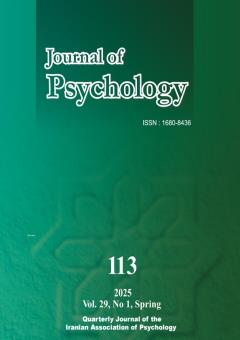Investigating the Mediating Role of Social Cognition between Mindfulness and Academic Enthusiasm
Subject Areas : روانشناسی تربیتی و تحولی
Meraj Derakhshan
1
*
![]() ,
Mohsen Alizadeh
2
,
Mohsen Alizadeh
2
![]()
1 - Department of Psychology and Counseling, Farhangian University, Tehran, Iran.
2 -
Keywords: social cognition, mental awareness, academic enthusiasm.,
Abstract :
The purpose of the present study was to investigate the antecedents and consequences of individual social cognition in the form of a causal model. The research method was correlation and structural equations. The statistical population of the research was formed by all the students of Shahid and Isargar schools in Shiraz in the academic year of 1402-03, of which 278 people (124 girls and 154 boys) were selected by multi-stage cluster sampling method. became To collect data, Nejati et al.'s social cognition scale, Brown and Ryan's mindfulness scale, and Wang et al.'s passion for school were used. To check the validity of the scales, confirmatory factor analysis was used, and Cronbach's alpha coefficient was used for reliability, and the results indicated that the validity and reliability were favorable. Descriptive statistics, Pearson's correlation coefficient and structural equation test were also used to analyze the data. The findings showed that mindfulness has a significant effect on social cognition. Social cognition also had a significant effect on academic enthusiasm. Social cognition was also able to mediate between mental awareness and academic enthusiasm. Conclusion: In general, it can be concluded that mind-awareness and academic enthusiasm are two of the main factors for investigating the antecedents and consequences of academic enthusiasm. Keywords: social cognition, mental awareness, academic enthusiasm. In general, it can be concluded that mind-awareness and academic enthusiasm are two of the main factors for investigating the antecedents and consequences of academic enthusiasm. Keywords: social cognition, mental awareness, academic enthusiasm. Keywords: social cognition, mental awareness, academic enthusiasm.
اسدی، روزبه؛ یاریاری، فریدون و شاهقلیان مهناز (1400). نقش ذهنآگاهی بر خوداستعلایی و بهزیستی فضیلتگرا با میانجیگری معنا در زندگی در تمرینکنندگان یوگا، پژوهش¬نامه روان¬شناسی مثبت، 7، 3(27)، 90-75.
درخشان، معراج؛ مکتبی، غلامحسین؛ علی¬زاده، محسن و عبدی¬شاهیوند، صمد (1401)، بررسی رابطه باورهای هوشی و اهمال¬کاری تحصیلی با واسطه¬گری شناخت اجتماعی. راهبردهای آموزش در علوم پزشکی، 15، 2، 110-100.
ریحانی، محمدباقر؛ شریفی، مسعود؛ درخشان، معراج؛ شفیعی، مریم؛ علیزاده، محسن و زارعی رقیه (1396). باورهای هوشی و اشتیاق تحصیلی: نقش واسطه¬گر شناخت اجتماعی. روانشناسی تربیتی، 13، 46، 48-31.
سعدی¬پور، اسماعیل (1396). تأثیر آموزش ذهن¬آگاهی بر حافظه کاری و اشتیاق تحصیلی دانشآموزان. پژوهش در یادگیری آموزشگاهی و مجازی، 5، 2(18)، 99-91.
علی¬زاده، محسن و درخشان، معراج (1400). بررسی مدل علی ذهن آگاهی، درگیری شناختی و فرسودگی تحصیلی. دست¬آوردهای روانشناسی بالینی، 7، 4، 30-21.
فارسیمدان، الهام؛ غضنفری، احمد و احمدی، رضا (1401). تبیین اشتیاق تحصیلی بر اساس ذهن آگاهی و خودکارآمدی تحصیلی: مدل تحلیل مسیر. دست¬آوردهای روان¬شناسی بالینی، 8، 2، 133-127.
کریمیان¬پور، غفار؛ کرمی، آزادالله و احمدی، تهمینه (1395). نقش وابستگی به تلفن همراه در پیش بینی خودپنداره تحصیلی و اشتیاق به مدرسه در دانش-آموزان. پژوهشنامه تربیتی، 11، 46، 80-61.
ملایی، فاطمه؛ حجازی، مسعود؛ یوسفی، مجید و مروتی، ذکرالله (1399). نقش میانجی ذهن¬آگاهی در رابطه بین اشتیاق تحصیلی و سرزندگی تحصیلی دانش¬آموزان دختر. پژوهش در نظام¬های آموزشی، 14(48)،90-75.
نجاتی، وحید؛ کمری، سامان و جعفری، صدیقه (1397). ساخت و بررسی ویژگی های روان سنجی پرسشنامه شناخت اجتماعی دانشجویان (شاد). شناخت اجتماعی، 7، 2(14)، 144-123.
نورعلیزاد، رحمان و درویشی، شهناز (1400). بررسی رابطه ذهن¬آگاهی با اشتیاق تحصیلی و احساس تعلق به مدرسه در دانش¬آموزان دختر دوره متوسطه اول شهر اهواز. اولین کنفرانس بین¬المللی علوم تربیتی، روانشناسی، علوم ورزشی و تربیت بدنی، ساری.
Arioli, M., Crespi, C., & Canessa, N. (2018). Social cognition through the lens of cognitive and clinical neuroscience. BioMed research international, 2018(1), 4283427.
Brown, K. W., & Ryan, R. M. (2003). The benefits of being present: mindfulness and its role in psychological well-being. Journal of personality and social psychology, 84(4), 822.
Couture, S. M., Granholm, E. L., & Fish, S. C. (2011). A path model investigation of neurocognition, theory of mind, social competence, negative symptoms and real-world functioning in schizophrenia. Schizophrenia research, 125(2-3), 152-160.
Cura, Ş. Ü., & Atay, S. (2023). Correlation between mindfulness, empathy and compassion levels of nursing students: A cross-sectional study. Archives of psychiatric nursing, 42, 92-96.
Gill, L. N., Renault, R., Campbell, E., Rainville, P., & Khoury, B. (2020). Mindfulness induction and cognition: A systematic review and meta-analysis. Consciousness and Cognition, 84, 102991.
Gomila, T., & Calvo, P. (2008). Directions for an embodied cognitive science: Toward an integrated approach. In Handbook of cognitive science (pp. 1-25). Elsevier.
Griffith, G. M., Bartley, T., & Crane, R. S. (2019). The inside out group model: Teaching groups in mindfulness-based programs. Mindfulness, 10, 1315-1327.
Guajardo Leal, B. E., Navarro-Corona, C., & Valenzuela González, J. R. (2019). Systematic mapping study of academic engagement in MOOC. International Review of Research in Open and Distributed Learning, 20(2).
Johnson, S. R., & Stage, F. K. (2018). Academic engagement and student success: Do high-impact practices mean higher graduation rates?. The Journal of Higher Education, 89(5), 753-781.
Martin, A. J., & Liem, G. A. D. (2010). Academic personal bests (PBs), engagement, and achievement: A cross-lagged panel analysis. Learning and Individual Differences, 20(3), 265-270.
Perkmann, M., Salandra, R., Tartari, V., McKelvey, M., & Hughes, A. (2021). Academic engagement: A review of the literature 2011-2019. Research policy, 50(1), 104114.
Perry-Parrish, C., Copeland-Linder, N., Webb, L., & Sibinga, E. M. (2016). Mindfulness-based approaches for children and youth. Current problems in pediatric and adolescent health care, 46(6), 172-178.
Pinkham, A. E., Morrison, K. E., Penn, D. L., Harvey, P. D., Kelsven, S., Ludwig, K., & Sasson, N. J. (2020). Comprehensive comparison of social cognitive performance in autism spectrum disorder and schizophrenia. Psychological Medicine, 50(15), 2557-2565.
Shamas, V., & Maker, J. (2018). Mindfulness, learning, and the creative process. Gifted Education International, 34(2), 129-143.
Wang, M. T., Willett, J. B., & Eccles, J. S. (2011). The assessment of school engagement: Examining dimensionality and measurement invariance by gender and race/ethnicity. Journal of school psychology, 49(4), 465-480.

